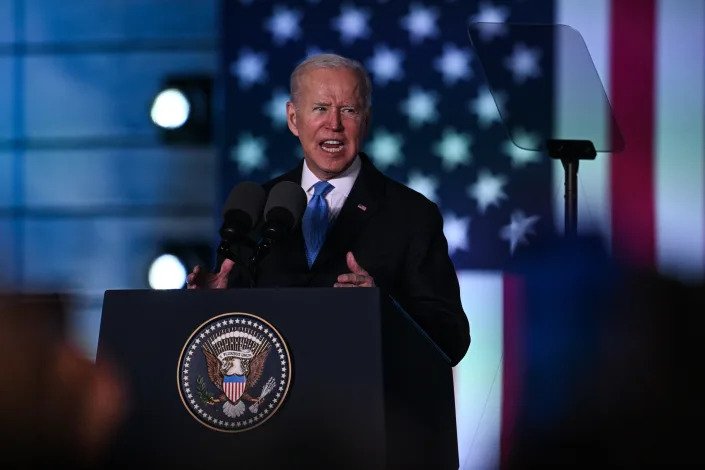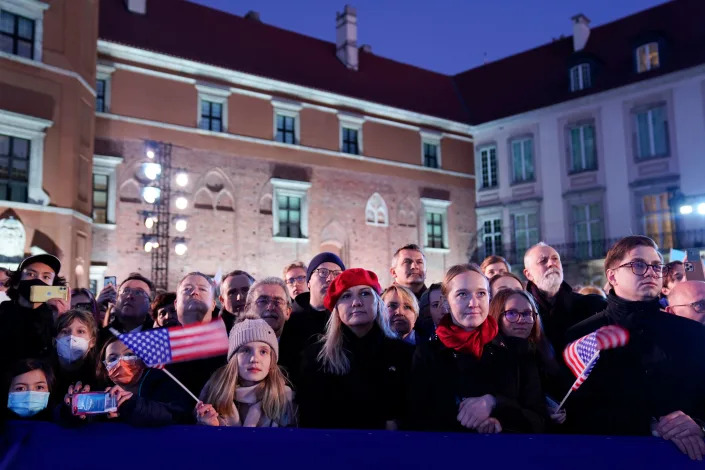BIDEN HOOF IN MOUTH
Kremlin official says West has declared 'total war' on Russia
Russian Foreign Minister Sergey Lavrov on Friday took aim at the sanctions the United States and other countries have imposed on Moscow for its invasion of Ukraine, saying he believes that the West has declared "total war" on Russia.
Lavrov made his comments during a meeting in which he described actions that Western nations have taken in response to Russia's invasion of Ukraine as "a real hybrid war," adding that "total war was declared on us," The Associated Press reported.
Lavrov also said that he believes the West has a goal "to destroy, break, annihilate, strangle the Russian economy, and Russia on the whole," according to the AP.
He then warned that Russia does have allies.
"We have many friends, allies, partners in the world, a huge number of associations in which Russia is working with countries of all continents, and we will continue to do so," Lavrov reportedly said.
Russia invaded Ukraine a month ago and has since stepped up its targeting of civilian areas. The Biden administration this week formally accused Moscow of war crimes in Ukraine.
President Biden is in Europe this week meeting with European and NATO members. New sanctions were announced Thursday on allies of Russian President Vladimir Putin.
Biden is scheduled to end his trip to Europe in Poland, where he will deliver a major address on Saturday. Poland shares a border with Ukraine.
The international sanctions have clearly hurt the Russian economy, though Lavrov emphasized that many states will decline to join that effort.
Blinken says US isn't calling for Russian regime change; Kremlin responds
Rebecca Morin and Katie Wadington,
Sun, March 27, 2022
Hours after President Joe Biden said Russian President Vladimir Putin “cannot remain in power,” Secretary of State Antony Blinken made clear the United States does not have a plan for regime change in Russia.
"I think the president, the White House, made the point last night that, quite simply, President Putin cannot be empowered to wage war or engage in aggression against Ukraine or anyone else," Blinken said Sunday during a press conference in Jerusalem.
"As you know, and as you have heard us say repeatedly, we do not have a strategy of regime change in Russia or anywhere else, for that matter,” he continued.
In a sweeping and forceful speech concluding a four-day trip to Europe, Biden on Saturday cast the war in Ukraine as part of an ongoing battle for freedom and ended with a blunt call for Putin to be stopped.
"For God's sake, this man cannot remain in power,” Biden said during a visit to Warsaw, Poland, in his strongest comments to date about his desire to see Putin gone.
Shortly after the speech, a White House official speaking on the condition of anonymity said Biden was not calling for Putin to be removed from office.
“The president’s point was that Putin cannot be allowed to exercise power over his neighbors or the region," the official said. "He was not discussing Putin’s power in Russia, or regime change."
Kremlin spokesman Dmitry Peskov responded, “it’s not up to the president of the U.S. and not up to the Americans to decide who will remain in power in Russia."
“Only Russians, who vote for their president, can decide that,” Peskov said.
Biden's speech was delivered hours after meeting with Polish President Andrzej Duda during a historic visit Saturday where the allies presented a united front against Russian aggression and reaffirmed their commitment to the NATO alliance. Biden also met with Ukrainian refugees, including children who asked him to “say a prayer for my dad or my grandfather or my brother. He’s back there fighting.”
Was it a gaffe or an escalation?: Biden stirs concern with remark that Putin 'cannot remain in power'
Was it a gaffe or an escalation? Biden stirs concern with remark that
Putin 'cannot remain in power'
After four days of alliance building, emotional interactions with refugees and stirring words about the need to fight for democracy, one sentence that President Joe Biden appeared to tack on to the end of his final speech in Poland threatened to overshadow all he had achieved as he deals with the most significant foreign policy crisis of his presidency.
“For God’s sake,” Biden said of Russian President Vladimir Putin, “this man cannot remain in power.”
The White House, which declined to say whether Biden had planned that remark, tried to quickly walk it back.
Biden was not promoting regime change, said an official who spoke on the condition of anonymity. The point the president was trying to make in his remarks in a packed courtyard of the Royal Castle in Warsaw on Saturday, the official said, was that Putin “cannot be allowed to exercise power over his neighbors or the region.”
Biden may have been saying what he believes, but it was not smart policy to say it aloud, said Tom Schwartz, a historian of U.S. foreign relations at Vanderbilt University.
“When Biden ad libs, there is trouble,” he said. “The administration needs to be more disciplined if it wants to get a negotiated settlement.”
Analysts warned that Biden’s remark could ripple across the NATO alliance as western leaders try to get Putin to end the war in Ukraine and – in a worst-case scenario – cause the Russian leader to expand the scope and duration of the conflict.
Biden’s comment could play into Russian propaganda, cause Putin’s already paranoid inner circle to crack down further on dissent inside Russia and prompt Putin to escalate the war on the grounds that he is protecting Russian interests, they said.
Lindsey Graham called for Putin's assassination: Even discussing it brings danger to US, experts say.
In Russia, “this comment will be viewed as direct interference in Russia’s internal affairs and play into Russian propaganda that the United States is a hostile power,” said Will Pomeranz, acting director of the Wilson Center’s Kennan Institute, a think tank dedicated to Russian and Eurasia research.
Putin’s inner circle probably viewed Biden’s statement as the president speaking out loud what they already believed was U.S. policy, said Heather Conley, president of the German Marshall Fund, which promotes cooperation and understanding between North America and Europe.
Biden’s earlier statements that Putin is a war criminal and the State Department’s formal determination Wednesday that Russian troops have committed war crimes hurt any chances of face-to-face conversations with Putin, Conley said.
Biden’s comment that Putin cannot remain in power “makes it almost impossible for the two leaders to speak,” she said.
After meeting Saturday with refugees from Mariupol, the city in southeastern Ukraine that has been relentlessly shelled, Biden called Putin “a butcher.”
Earlier this month, when South Carolina Sen. Lindsey Graham suggested Putin should be assassinated, the White House immediately made clear regime change is not U.S. policy.
That made Biden's comment Saturday all the more striking.
Some analysts said Biden’s remark is unlikely to change Putin’s calculus on the war in Ukraine.
“Indeed, it will only confirm that he has no path to retreat,” Pomeranz said. “The Russian people will ultimately decide the fate of Vladimir Putin, although obviously, it is unlikely to happen as a result of an election. Nevertheless, it appears that Putin is headed to a major military defeat and catastrophic economic collapse, a combination that is usually fatal even for an autocratic ruler.”
Richard Haass, president of the Council on Foreign Relations, said the White House’s attempt to walk back Biden’s remark is unlikely to placate Russia.
“Putin will see it as confirmation of what he’s believed all along,” Haass wrote on Twitter. He called the comment a “bad lapse in discipline that runs risk of extending the scope and duration of the war.”
“Our interests are to end the war on terms Ukraine can accept & to discourage Russian escalation,” Haass wrote. “Today’s call for regime change is inconsistent with these ends.”
After Biden’s speech, Kremlin spokesman Dmitry Peskov told The Associated Press that “it’s not up to the president of the U.S. and not up to the Americans to decide who will remain in power in Russia.”
“Only Russians, who vote for their president, can decide that,” Peskov said. “And of course it is unbecoming for the president of the U.S. to make such statements.”
Tom Nichols, an expert on U.S.-Russia relations at the U.S. Naval War College, called that a ”whatever" response from Moscow.
“Which is about right and about all the whole thing warrants while the goal here is to end a war of Russian aggression,” Nichols tweeted.
Garret Martin, an expert on transatlantic relations at American University, said Putin already believed that the U.S. was out to get him, so Biden’s comments are not likely to change his calculus
But Moscow could use them to argue to Russians that America’s real goal is not helping Ukraine but undermining the Russian government.
“In the battle for narratives, maybe it helps Putin domestically a little bit,” Martin said.
In his speech, Biden made an appeal to ordinary Russians, telling them: “This war is not worthy of you, the Russian people.”
“The American people stand with you and the brave citizens of Ukraine who want peace,” he said.
'A bad déjà vu': Under the crush of Western sanctions, Russians fear a return to dark economic days
Martin and others said other aspects of Biden’s speech and trip will have longer lasting impacts, particularly the solidarity that Biden helped build among allies.
“While the Putin 'cannot remain in power' line will get the most attention, don't be distracted by it,” David Rothkopf, author of “National Insecurity: American Leadership in an Age of Fear,” wrote on Twitter. “It was the overall thrust of the speech and the degree to which Biden and our allies are backing it up that matters the most in a historical sense.”
The U.S. and its allies have never been more unified in an approach to an international security crisis in the post-Cold War era, said Timothy Naftali, a presidential historian at New York University. And Biden deserves some credit for that, he said.
“Understandably, the president let his emotions get away from him,” Naftali said. “It is hard to imagine any modern state would want to be led much longer by anyone who intentionally bombs and starves out civilians.”
Contributing: Associated Press
This article originally appeared on USA TODAY: Biden's comment that Putin can't remain in power stirs concern




No comments:
Post a Comment